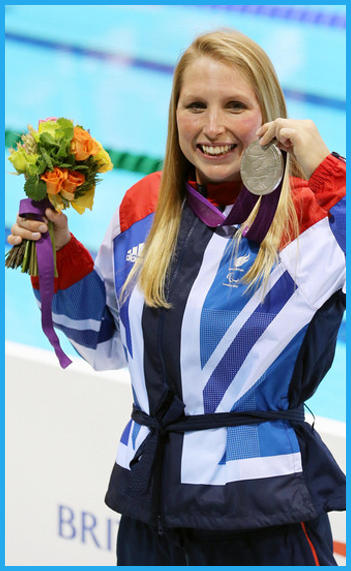When I lost functionality from the waist down in 2005 due to Transverse Myelitis, I had to learn how to walk again. As part of that process, I was prescribed aquatic therapy. I worked closely with a physical therapist who coached me in the pool and slowly but surely I was able to walk again.
Aquatic therapy and exercise have been shown to be extremely beneficial for people living with MS. A pool keeps your body temperature cool and makes movements easier. According to Healthline, through aquatic exercise, “you may be able to do things while in a pool you’re not able to do out of the pool, such as stretch, lift weights, or perform cardio exercise, all of which can boost both mental and physical health.” For me, having a pool in my back yard is my safe haven where I can keep cool, exercise and play with my kids.
Imagine now that your dream was to compete for your country in the Olympics and swim towards Olympic gold, only to have an MS diagnosis shatter that dream.
This was the case for Stephanie Millward. In 1999, Stephanie was fifteen years old and had broken the record for the 100 meter backstroke. She was on her way to qualifying for the United Kingdom’s Sydney Olympic swim team when a diagnosis of MS derailed her dreams of Olympic gold. What she did to overcome her disease is truly inspiring.
MC: Stephanie, thank you for joining me. It is an honor to share your story on my blog.
Stephanie: Thank you very much.
MC: Take my readers back to that moment when you were fifteen and about to qualify for the Olympics. What were your initial symptoms?
Stephanie: I was in the swimming pool training when I first noticed the symptoms. I was dizzy and could not see very well. I bumped into a couple of swimmers then when I tried to get out of the water I fell back in and had to have two people help me out of the water. This was very embarrassing. I went to the doctors the next day and they said that due to the dizziness maybe I should go to an ENT (Ears, Nose and Throat) doctor so my Mum paid for me to be seen privately. The ENT doctor said that there was nothing wrong with my ears, nose or throat but noticed a flickering in my eyes so said I should go see a neurologist. Quite ironically there was a neurologist just outside the door and he checked me over and said I should have an MRI scan and see him again tomorrow. So we did. It took about six months for the MS diagnosis and in this time I went blind three times and was paralyzed once.
MC: At what point did you have to withdraw from the qualifiers?
Stephanie: I had to give up swimming straight away because I struggled to walk and to see. This was a very depressing time for me and I cried a lot for the things that I wasn’t able to do anymore.
MC: At what point during your recovery did you decide to start swimming competitively again?
Stephanie: I had put on a lot of weight and still struggled to move so I employed a personal trainer to re-teach me how to stand and then walk. When I was able to walk, I started thinking about swimming because the water carries my weight which makes it easier than walking. I asked my Mum to come to the pool with me because I knew I was going to struggle to get out. She came but after watching me struggle to move, she told me afterwards that she couldn’t come again because it was so sad. I kept going swimming but told the lifeguards that I was going to struggle to get out and they often had to help me. I got stronger and stronger. One morning while I was swimming a friend of mine, Mike Cox, asked me if I could teach his friend how to swim. I obviously said yes. This guy who I taught was Adrian McHugh who I married in 2013. He was the one who said that I still had great swim strokes that were good enough for London 2012 and asked why don’t I train for London? I still had that Olympic dream and Adrian was the catalyst pushing me towards my dream!
MC: Describe the feeling when you took the podium for the first time as a medal winner in the Paralympic games?
Stephanie: AMAZING!! This was my dream come true. I had beaten the MS and won my medal!! It was such an incredible feeling and it was so nice to have the whole country cheering for me!!!
MC: How do you feel that swimming helps you in your battle against MS?
Stephanie: Swimming gives me courage and confidence in my fight against MS. I know I will struggle to get out of the pool at the end of the race but while I’m in the water I feel like I did when I was able. I can do anything – no limitations!
MC: What advice do you have for my readers?
Stephanie: Keep believing in yourself and keep chasing your dreams. Anything is possible and all you have to do is believe in yourself. The fight is not going to be easy but with every step you will get stronger and stronger. Learn how to manage your MS and find out what makes it angry and flare up and find out what puts you back in charge. Keep believing!
After fifteen years of living with MS, Stephanie Millward shows no sign of slowing down. She continues to compete in championship events around the world. Her autobiography, Paying The Price by Stephanie Millward, is tentatively scheduled to be released this December. This will be a must read for those living with MS or anyone struggling to overcome adversity She is truly an inspiration to all of us living with Multiple Sclerosis.
To learn more about Stephanie Millward please visit her website:
http://www.stephaniemillward.co.uk/index.html (under construction)
Watch Stephanie Win the Gold!
[youtube=https://www.youtube.com/watch?v=Pqa1vJK_n18]
Resource:
http://www.healthline.com/health/multiple-sclerosis/exercises


Hi Matt!! I hope you are very well and happy!! My autobiography ‘Paying the Price’ is being released on 6th November!!! I hope you enjoy reading it! Hope to chat again soon!
Stephanie Millward
Awesome news Stepanie! I can’t wait to read it!!!
Pingback: Stephanie Millward - Going for the Gold - Patient Activation Network